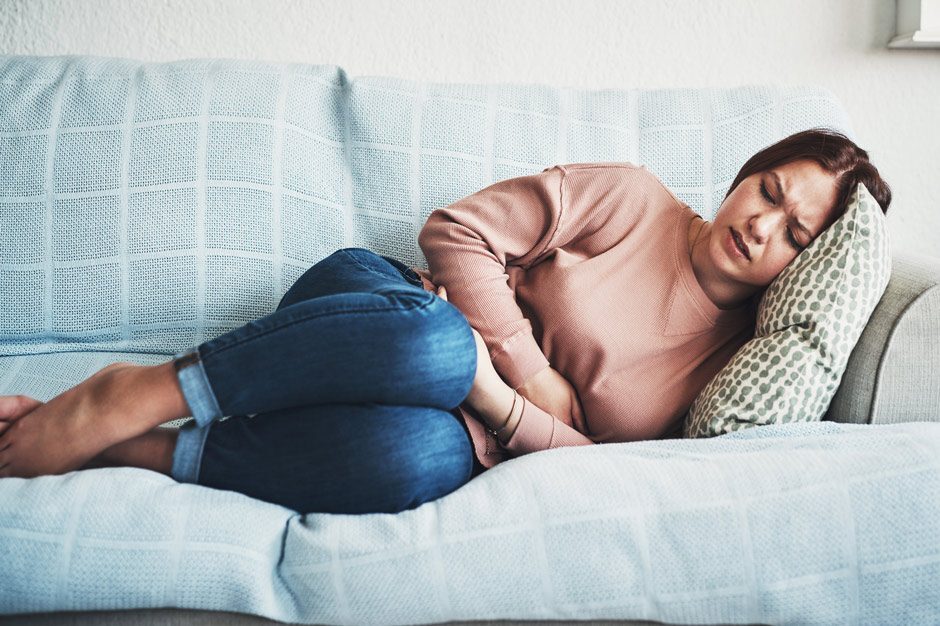Blog
Home > About Us >Lower abdominal pain – when is it time to worry?
Lower abdominal pain – when is it time to worry?

Are you suffering discomfort in the area beneath your belly button? This lower abdominal pain (also known as pelvic pain) could feel dull or sharp. It might be intense and sudden (acute) or continue for months (chronic lower abdominal pain).
Many women suffer lower abdominal pain at some point and it is often rooted in the reproductive system. There are lots of potential causes of lower abdominal pain and here at The Gynae Centre, many women come to us to resolve it. But what are the different types and what is the most common reason for lower abdominal pain? Most importantly, when is it time to worry? Let’s take a look.
What type of lower abdominal pain do I have?
Dr Albert Aka, Consultant Gynaecologist at The Gynae Centre says: “There are various types of lower abdominal pain, with distinct causes. Your pain could be intermittent or constant. It could affect the entire pelvic region, or it could dwell in a small part of it.
“We call lower abdominal pain chronic when it persists for six months or beyond. Chronic lower abdominal pain may come and go or be with you constantly.
“Acute lower abdominal pain however often seems to ‘come out of nowhere’, appearing strongly and abruptly – and it must be explored by a doctor right away.”
Various types of lower abdominal pain include:
- Discomfort that develops over time but does not subside
- An abrupt sharp, stabbing or burning feeling
- A sensation of knotting or twisting
- Pain confined to specific activities, e.g. passing water, having sex, or exercising
- A dull ache
- A feeling of something pressing down on your lower abdomen
- A cramping or throbbing pain, which may fluctuate
You may have other symptoms along with this lower abdominal pain (see below).
What causes lower abdominal pain in females?
In women, lower abdominal pain could be caused by many things, but it is most often connected to the reproductive system. For example, female lower abdominal pain could be due to:
- Menstrual cramps
- A urinary tract infection (UTI)
- Ovulation
- Fibroids (non-cancerous growths made up of muscle and fibrous tissue growing in or around the womb)
- Endometriosis (when tissue like that of a woman’s womb lining – endometrial tissue – grows outside of the uterus)
- Pelvic Inflammatory Disease (PID) which is usually caused by a sexually transmitted infection like gonorrhoea or chlamydia. It is simple to treat but should be addressed quickly because if left, it can be lead to problems such as infertility
- Ovarian cysts (fluid-containing sacs that grow on the ovaries)
- Pregnancy pelvic pain
Much more rarely, lower abdominal pain could be a symptom of a problem more severe, for example ectopic pregnancy, ovarian cancer or uterine cancer. It’s always a good idea to make an appointment with your doctor or gynaecologist to be sure.
When should I worry about lower abdominal pain?
Lower abdominal pain is more common among women than men and most women will experience it at some point. But when is it time to worry?
Book in to see a gynaecologist or a doctor if:
- Your lower abdominal pain persists
- Your period pain gets worse
- You have lost weight for no apparent reason
- You have suffered bloating for a few weeks or longer
- You have pain during sexual intercourse
- You have continual constipation or diarrhoea
- You have noticed unusual discharge or bleeding
- You see blood in your stool or urine
Seek medical advice right away if you are suffering lower abdominal pain and:
- You are pregnant or could be pregnant
- You have a temperature
- The pain is extreme or getting worse
- It hurts when you move or touch the lower abdominal area
- You are struggling to pass stools or urine
How can I relieve lower abdominal pain?
Lower abdominal pain will call for different treatment depending on what it is caused by. For example, pain caused by pelvic inflammatory disease calls for a course of antibiotics. If a doctor suspects you have endometriosis, you may be offered treatment with hormones as well as painkillers, or more unusually ‘keyhole surgery’ to remove lesions and scarring. In the rare instance that severe and acute lower abdominal pain is caused by an ectopic pregnancy, you may need surgery. If a gynaecologist believes you may have ovarian cysts, a transvaginal ultrasound will be required to confirm it and depending on the nature and the size of the cyst(s), you may need either hormone medicine or a surgical procedure.
Dr Aka says: “Often lower abdominal pain is nothing serious, but we must always be safe and get a proper diagnosis. A doctor will want to know about how often you experience the pain, what it feels like, how intense it is, whether it radiates to other places, any other symptoms and conditions you may have, and of course your medical history. Whether your lower abdominal pain is chronic or acute, seek the advice of a doctor as soon as possible.”
If you are suffering from lower abdominal pain or any other potential gynaecological problem, The Gynae Centre is here to help. Our doctors are highly experienced, and we can identify the problem swiftly, giving you peace of mind. For advice you can trust, book an appointment online.
